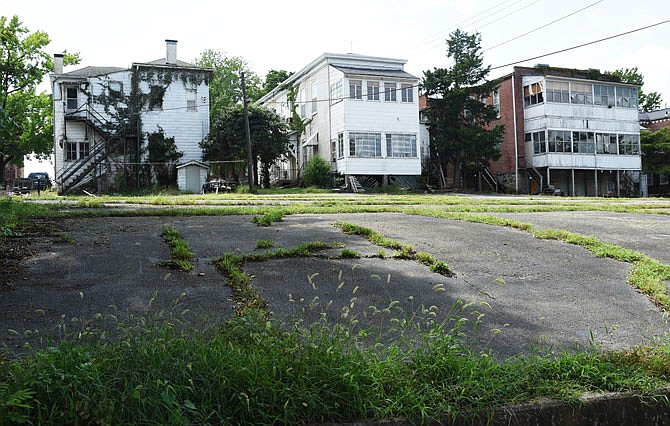The outside counsel retained by Jefferson City to defend it against accused East Capitol Avenue property owner Barbara J. Buescher beat the Missouri Court of Appeals Western District in Kansas City filing deadline by 88 minutes Thursday, submitting a 39-page brief affirming Circuit Judge Patricia Joyce ruled correctly last May 17.
Marshall Wilson, writing on behalf of the Berry Wilson Law Firm, responded to the 53-page brief filed Nov. 25 by Buescher attorney Audrey E. Smollen, of the Rosenthal Law Firm. A three-judge panel at the Court of Appeals will now review the briefs submitted by Wilson and Smollen and deliver its decision at a later date.
Wilson said of his legal effort, "It is a strong brief outlining for the Court of Appeals the legal reasons that Circuit Judge Judge Joyce correctly held that the city acted well within its constitutional, statutory and charter powers in the way it went about recovering its costs expended in making Mrs. Buescher's properties safe for the community."
At issue is a $24,785.33 judgment Joyce ruled Buescher owed the city for expenses the municipality incurred in resolving building code violations at 14 of Buescher's ramshackle properties in the historic East Capitol Avenue neighborhood. To date, the city has received none of the money Joyce said Buescher "is justly indebted" to pay.
Smollen, who told the News Tribune that Buescher paid for her legal services, said Thursday she could not comment on the brief filed earlier in the afternoon. Smollen had notified the Court of Appeals of her intent to oppose the Joyce ruling last June 24. Her brief was received in Kansas City the Friday after Thanksgiving, and Berry Wilson Law was originally to have replied within 30 days. Instead, the Jefferson City lawyers requested and received an additional 30 days to absorb, research and pen the rejection.
Wilson and his associates authored four basic responses to Smollen's work on behalf of Buescher.
He first asserted, "The trial court correctly entered judgment in favor of Respondent (Jefferson City) and against Appellant (Buescher) on the evidence before it. Respondent had the authority to sue for and collect the actual costs expended and the administrative costs associated therewith, from the Appellant individually."
Next, Wilson states the Missouri Constitution allows a city "to board up the windows and doors of Appellant's vacant buildings, and to recover its costs therein expended."
In a third response, Wilson said of Smollen's brief, "The pleadings do not establish any facts. The evidence adduced at trial is scant and ambiguous at best. Appellant bears the burden to establish that the administrative remedies available to Appellant were insufficient under the law. In the absence of any evidence as to what hearings were held, the Judgment below must be affirmed."
Wilson's fourth level of response said, "Respondent was empowered to abate the weed and trash nuisances on Appellant's properties. Both sections (of the Constitution) and Respondent's ordinances authorized the recoupment of its abatement expenses in the trial court below. There being no error, the Judgment should be affirmed."
Finally, Wilson suggests to the multi-judge Appeals Court panel in Kansas City that Smollen must be denied her request.
"The trial court took evidence that consisted of the Respondent's ordinances relating to nuisances and the Special Tax Bills and accompanying Certification of Cost documents for each of the 21 code violations and the abatement actions taken at 13 different properties owned by Appellant.
"The abatement actions included demolition of buildings, boarding up windows and doors, removing trash, weeds, broken tree limbs and debris. For each type of abatement action taken, Respondent had statutory authority to (A) promulgate the ordinance, (B) perform the abatement work when and how it did and (C) to recover its abatement costs in the trail court below."
In Missouri, an appeal is neither a retrial or a new trial. No new witnesses are heard and no new evidence is received by the Appeals Court. The appeal is based on arguments there were errors in the original trial's procedure or the trial judge erred in his or her interpretation of the law - thus great importance is placed by the three-judge panel on the briefs now filed by Wilson and Smollen on behalf of their clients.

